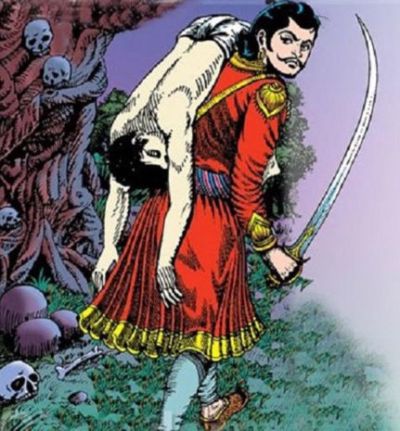Read the previous part here…
“I consider the man who was sensitive about what he slept on, as the most sensitive of the three. The mark caused by the hair manifested on his cheek, and was seen by one and all. The other two may have been sensitive as well, but it is also possible that they had received information about the rice and the maiden from someone else. This was not possible in the case of the youngest, since there was explicit proof of his sensitivity.”
As the king uttered these words, the Vetāla flew off his shoulder, laughing. And King Vikram once more started to walk towards the banyan tree, determined to fetch him.

नवमो वतेालः
The ninth story
Anaṅgarati and her Four Suitors
ततो गत्वा पुनस् तस्माच् छिंशपापादपान् नृपः ।
स त्रिविक्रमसेनस् तं स्कन्धे वेतालम् अग्रहीत् ॥ १२,१६.१ ॥
प्रस्थितश् च ततस् तेन वेतालेनाभ्यधायि सः ।
राजन् क्व राज्यं क्वैतस्मिञ् श्मशाने भ्रमणं निशि ॥ १२,१६.२ ॥
किम् एतन् नेक्षसे भूतसंकुलं रात्रिभीषणम् ।
चिताधूमैर् इव ध्वान्तैर् निरुद्धं पितृकाननम् ॥ १२,१६.३ ॥
कष्टं कीदृग् ग्रहो ऽयं ते भिक्षोस् तस्यानुरोधतः ।
तद् इदं शृणु तावन् मे प्रश्नं मार्गविनोदनम् ॥ १२,१६.४ ॥
King Vikram once again reached the banyan tree, and taking down the Vetāla, threw him across his shoulders, and started to walk back.
The Vetāla said “Oh king! Wandering in a cremation ground in the middle of the night does not suit your royal stature! Can’t you see that this is the place of the dead, and not the living? Haunted by Bhūtas and as dark as the smoke of the cremation pyres?”
“Why waste all your valor in this futile undertaking, just to please that tantrik?”
“Well, we have set out on the journey again, so here is a story for you, so as to make this journey more enjoyable…”
अवन्तिष्व् अस्ति नगरी युगादौ देवनिर्मिता ।
शैवी तनुर् इवोद्दामभोगिभूतिविभूषिता ॥ १२,१६.५ ॥
पद्मावती भोगवती या हिरण्यवतीति च ।
कृतादिषु त्रिषु ख्याता कलाव् उज्जयिनीति च ॥ १२,१६.६ ॥
तस्यां च वीरदेवाख्यो राजाभूद् भूभृतां वरः ।
तस्य पद्मरतिर् नाम महादेवी बभूव च ॥ १२,१६.७ ॥
सो ऽथ राजा तया साकं गत्वा मन्दाकिनीतटे ।
हरम् आराधयामास तपसा पुत्रकाम्यया ॥ १२,१६.८ ॥
चिरं तपःस्थितश् चात्र परितुष्टेश्वरोदिताम् ।
कृतस्नानार्चनविधिः शुश्रावेमां गिरं दिवः ॥ १२,१६.९ ॥
राजन्न् उत्पत्स्यते पुत्रः शूरस् तव कुलोद्भवः ।
कन्या चानन्यसामान्यलावण्यन्यक्कृताप्सराः ॥ १२,१६.१० ॥
श्रुत्वैतां नाभसीं वाणीं सिद्धाभीष्टः स भूपतिः ।
वीरदेवः स्वनगरीम् आययौ महिषीसखः ॥ १२,१६.११ ॥
तत्रास्य शूरदेवाख्ये जाते प्रथमम् आत्मजे ।
तस्यां पद्मरतौ देव्यां क्रमाद् अजनि कन्यका ॥ १२,१६.१२ ॥
अनङ्गस्यापि रूपेण रतिम् उत्पादयेद् इयम् ।
इत्य् अनङ्गरतिर् नाम्ना पित्रा तेन व्यधायि सा ॥ १२,१६.१३ ॥
वृद्धिं गतायास् तस्याश् च स पिता सदृशं वरम् ।
प्रेप्सुर् आनाययत् पृथ्व्यां पटेषु लिखिथान् नृपान् ॥ १२,१६.१४ ॥
In the kingdom of Avanti, there is an ancient city that was built by the devas, at the very beginning of shristi. It is as limitless as the body of Śiva, and even as his body is covered in ashes, this city was renowned for it’s prosperity.
It was called Padmāvatī in the Kṛta Yuga, Bhogavatī in the Tretā Yuga, Hiraṇyavatī in the Dvāpara Yuga, and Ujjayinī in the Kali Yuga. In this city lived a valorous and just king named Vīradeva, and he had a queen named Padmarati.
Once the king performed a great yang on the banks of the river Mandākinī and worshipped Śiva, in order to obtain a child. The yang continued for months and months, and the king performed all the rites religiously and with full devotion.
At last, he heard the vani of Śiva himself, who said…
“O King! There shall be born to you a brave son who will be the head of the family, and a daughter, who will be so beautiful that she will put the apsaras of swarga to shame!”
King Vīradeva thanked the devas, and returned to his city. Soon, born to him was a son he named Sūradeva, and after some time his queen gave birth to another child, this time a daughter. Her father named her Anaṅgarati, and it is said that she was so beautiful that even Kāma would have been moved with her beauty.
As she came of marriageable age, the king decided to find for her a suitable husband. And so he arranged for the portraits of all the kings in the world, so that she could choose her desired life-partner.
The king then called his daughter, and said…
to be continued…
